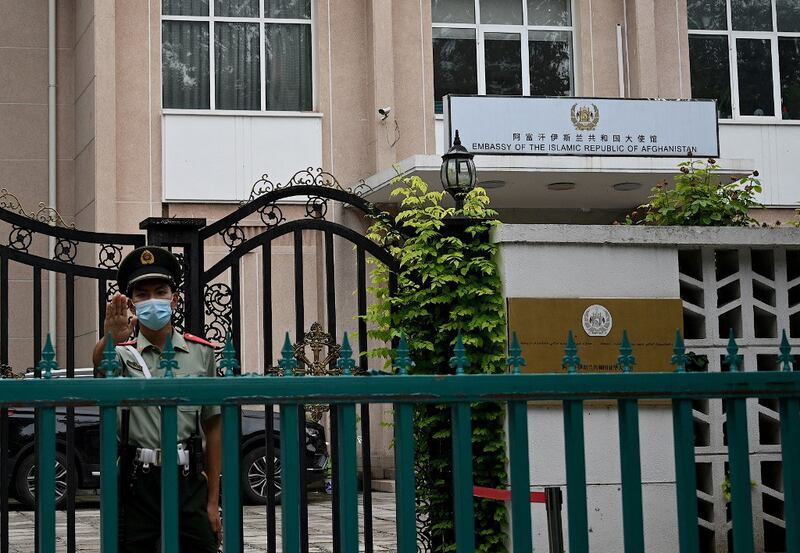Political analyst Bradley Jardine is winding up a two-year fellowship at the Kissinger Institute on China and the United States at the Wilson Center in Washington, with a focus on China's expanding economic and political presence in the countries of the former Soviet Union, and Sino-Russian security issues in Central Asia. He spoke to K urban Niyaz of RFA's Uyghur Service about the impact on the Uyghurs in Afghanistan and Xinjiang of the fall of the Afghan government to the Taliban.
RFA: Taliban forces and the Chinese government have long held talks in Beijing. With the country under Taliban control, what impact will this have in the future?
Jardine: Yes. The situation in Afghanistan is certainly critical for Uyghurs. The Taliban's engagement with China expands back into the late 1990s, when they first began engagement. It continued this engagement with China's long-running underground diplomacy with the Taliban, but become much more public-facing. The Chinese government essentially had assumed that the Taliban will have some sort of governing role in Afghanistan, so they hedged their bets in a way that they can cooperate with them.
This poses a danger for Uyghurs. Historically, the Taliban have tried to move Uyghur populations in Afghanistan to monitor them. There are also cases of the Taliban deporting Uyghurs from the regions that they've controlled in Afghanistan. Increasingly, there are talks between the Chinese side and the Taliban representatives.
From sources on the ground, I contacted Afghan Uyghurs. I'm informed that their ID documents mentioned that they are quote, unquote, "Chinese Immigrants,” even though many of these have Afghan citizenship. They are very worried right now that as the Taliban seizes important government buildings, it will get access to records and it could potentially give China access to ID cards which would be able to identify Uyghurs and have them deported back to China. So increasingly as the government collapses and the Taliban gain more access to information in the country, particularly the national security services of Afghanistan, some of the registration documents as well, could be used to target Uyghurs.

RFA: As Taliban forces control Kabul and the entire country, in your eyes, is it an opportunity or risk for China, especially right now?
Jardine: I don't think China views it as an opportunity so much as China views Afghanistan as a risk that needs to be managed. I think that it wasn't an ideal situation for America to have left in China's view, especially so haphazardly, which has given the Taliban what appears to be a major victory. This could bolster Islamist forces -- not just Taliban, (but) more radical factions within the group. China worries that the Taliban won't be able to restrain the use of Afghanistan as a safe haven for such groups and organizations might pose a threat to China in the long run. So Afghanistan is one of the few areas where Chinese and American and Western, more broadly, interests actually align to a greater degree.
The problem China will have now is taking a very real approach and understand that the Taliban probably will be controlling, governing the majority of Afghanistan for the foreseeable future. It's trying to work out relations within that that will serve its own very narrowly defined interests which are stopping militant groups hostile to China from operating within its borders. Whether the Taliban can actually ensure this is an open question. They've been unable to prevent this kind of radicalism from festering within the country, and it seems unlikely that the Chinese approach is going to succeed in the long run.
RFA: We have learned that the Afghan government had arrested dozens of Chinese spies early this year, and their mission was to show the world the existence of the ETIM. So do you think a similar story may happen now that the Taliban has taken control of the capital?
Jardine: Well, I think the example of the Chinese group that was impersonating a terror recruitment organization is interesting because it shows it's a much more aggressive form of security than China has been known to pursue in the past outside its borders or in its immediate region, particularly in Central Asia, Afghanistan, Pakistan. So that showed a real forward-oriented security approach similar to around Badakhshan Province where you're having China with its military and strategic facilities being set up in recent years, military facilities in Tajikistan’s Pamir Mountain region, for example, which overlook the border in Afghanistan.
So I expect we will see more. China is very cautious about Afghanistan when you follow the community of foreign policy observers, it talks a lot to use the cliché of Afghanistan as the graveyard of empires, etc. So China is going to be hesitant to get involved on a mass scale in terms of the security situation in Afghanistan. I do expect that we'll see a lot more of these small-scale engagements, operations of setting up possible reconnaissance facilities, more cooperation with the security services in the region, but lower-scale target is and it will be focused primarily on the idea of eradicating anything that China deems to be an Uyghur militancy within the region.
